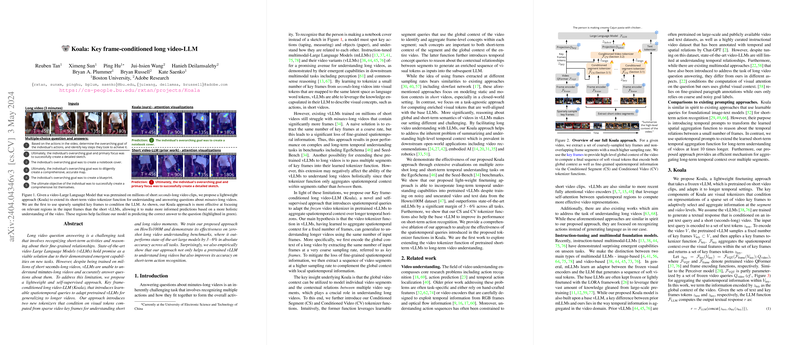Koala: Key Frame-Conditioned Long Video-LLM
The paper introduces "Koala," a novel approach designed to enhance the capabilities of video-LLMs (vLLMs) for understanding long-duration videos. The motivation stems from the limitations of current vLLMs, which are typically trained on short video clips and lack the ability to process and comprehend the extensive spatiotemporal information present in longer videos. To address these challenges, Koala integrates learnable spatiotemporal queries to modify and extend the pretrained video tokenizers within vLLMs to adapt them for tasks involving long videos.
The Koala model is built on a frozen vLLM architecture with the key innovation lying in its ability to effectively integrate information from key frames and video segments. Specifically, the model introduces two novel tokenizers: the Conditioned Segment (CS) tokenizer and the Conditioned Video (CV) tokenizer. The CS tokenizer targets the aggregation of frame-level visual concepts pertinent to both local segment contexts and overarching video narratives, while the CV tokenizer focuses on reasoning about the relationships between segments conditioned on the entire video's global context.
The Koala approach demonstrates substantial improvements in performance on long video question answering and understanding benchmarks such as EgoSchema and Seed-Bench. Impressively, Koala surpasses pretrained vLLMs by 3 - 6% in absolute accuracy on these tasks. Additionally, empirical results show that Koala also enhances short-term action recognition, underlining the robustness and versatility of the proposed tokenization strategies.
From a technical standpoint, Koala adapts the pretrained video QFormer through the introduction of learnable queries that engage with sparsely sampled key frames, thus emphasizing regions pivotal to understanding video narratives. This approach ensures that the model retains the fine-grained contextual information often lost in traditional methods, which rely on coarsely sampled frames. Moreover, the hierarchical design of Koala allows for a scalable aggregation of temporal context before the information is ingested by the LLM, ensuring efficiency juxtaposed with enriched spatiotemporal insights.
Practically, Koala has significant implications for applications requiring deep video understanding, such as video recommendation systems, robotics, and embodied AI. Theoretical implications include advancing the methodology for extending short-term memory models to long-term sequence processing, a pivotal challenge in contemporary AI research.
Looking ahead, Koala's premise can pave the way for future research into scalable, efficient video understanding models that can seamlessly process extensive video content. Potential research avenues include refining context aggregation techniques, extending tokenization strategies to diverse video domains, and improving model robustness to noisy and uncurated training data.
In summary, Koala exemplifies an efficient and effective method for enhancing the capabilities of vLLMs in long video comprehension. Its ability to surpass existing pretrained models on relevant benchmarks underscores its potential impact and further applications in the field of AI-driven video understanding.
